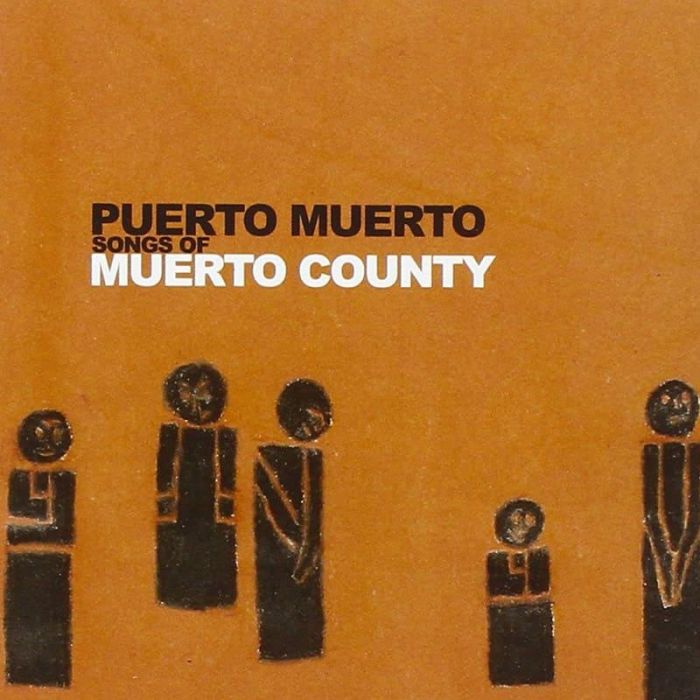Songs of Muerto County by Puerto Muerto (Review)

I think the one thing that has always kept me from enjoying Puerto Muerto’s music too much is that oftentimes, it simply feels like they’re trying way too hard to sound dark and evil on albums such as See You In Hell and Your Bloated Corpse Has Washed Ashore. In theory, I should love the dark southwestern sounds that the band employs, dipping into the same southern gothic pool as some of my favorite artists. But their efforts always felt too over-the-top, too intent on trying to wed their dark carnival sound with a gallows sense of humor in a heavy-handed manner.
And so when I read that their latest album, Songs of Muerto County, was envisioned as a “lost” soundtrack to The Texas Chainsaw Massacre, I just rolled my eyes and prepared myself for more of the same. Suffice to say when I discovered that the album felt like a complete turnabout from the duo’s previous recordings. Much of this has to do, ironically enough, with the group’s restraint here. Indeed, for an album intended as a soundtrack for one of the most (in)famous exploitation films of all time, there’s very little that feels exploitative about it.
For starters, none of the songs actually match up to the movie. I detect no lyrical references to the movie’s scenes or characters, nothing that is an explicit tie-in (and thankfully, there are no samples — if I’d heard a single chainsaw, I would’ve stopped listening right then on general principle). As such, it might actually work better to think of this album as less a soundtrack, and perhaps more as a collection of songs that one might hear on the AM dial while driving down Texas backroads and through the sort of forgotten places where one might stumble across a place like the Sawyer house.
The album’s sound draws quite a bit from the western soundtracks of Ennio Morricone, and the disc’s instrumental sections are its most convincing and solid moments. Like Morricone’s legendary soundtracks, these instrumentals conjure epic, foreboding vistas haunted by spirits both sad and vengeful.
“Ghostee” begins with a dusty, plucked acoustic guitar, which lays down a sparse foundation that is slowly fleshed out by the ghostly, windswept vocals and galloping drums of Christa Meyer. The same ghostly vocals can be heard on “Black Maria,” which sweep across the landscape with a lonesome harmonica while train-like drums and guitars churn away in the distance. And “Walking” begins on a regretful tone with Meyer’s wavering voice, before the drums kick in like a thunderclap of doom and Tim Kelly’s static-laced death rattle suddenly casts a funeral-like pall over the song.
On “Josephine,” Christa Meyer and Tim Kelly’s vocals sway along with acoustic guitar and harmonica, their voices (and especially Kelly’s deep bass) giving the song a sense of anxiety and gloom. “What Have I Done” kicks up the dust a bit, a stomping little rock number whose fiery guitars and pounding drum lending credence to the band’s “punk folk” label, as do its lyrics of unrequited love and gun theft. Kelly’s vocals take on an air of drunken rumination on “Apple Pie,” its rather innoccuous-sounding lyrics containing disturbing undertones that are echoed by the skeletal strains of a banjo.
With its waltz-like pace and stately violin, “Wondering” might be as far removed from Leatherface et al as one can imagine, but the sparse instrumentation and the longing subject matter of the song’s lyrics still lend it an evocative air. And Meyer’s trembling voice doesn’t hurt one bit. On songs like these, I feel like I’m hearing the music I’ve always wanted to hear from Puerto Muerto, music that evokes a certain gloomy, sorrowful sense of place and time, as well as a morose atmosphere, without having to resort to cheap shock tactics.
Puerto Muerto is planning to tour England this summer, playing shows while the movie screens behind them. Personally, I think a wiser and more effective move would be to scrap the Massacre altogether, and instead, come up with an original short film inspired by the song’s dusty atmospherics and moody vocals. Otherwise, I think there’s a danger that the songs will always remain in the Massacre’s shadow. Indeed, I think I’d like to forget about this whole “lost” soundtrack business altogether; it almost feels like a disservice to the album to label it as such. Songs of Muerto County is more than capable of standing on its own merits without such a crutch.